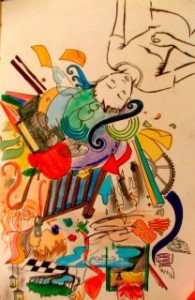Becoming Realer: Identity, Craft and the MFA is a column that explores issues of poetry, theory and writing craft in relation to the personal experiences of Saint Mary’s College of California Creative Writing MFA candidate and LR staff writer, Kelsay Myers.

Workshop has become my favorite class. Maybe because I genuinely enjoy reading other people’s work and sharing my own. Maybe because the literary critic in me likes playing with the writer, or maybe it’s because on day one, my new piece, “The Red Frame,” caused some controversy. There’s nothing like starting off by making waves!
The piece begins:
What is my life concept? What is my story?
I need a new frame, but I don’t know the old frame.
Two students got into an argument about who the audience of the piece was, why it provided no answers, and what was going on in general. Two students argued, but the class itself was split in their views pretty evenly down the middle: one camp loved it, the other was confused. To the people who asked who the audience is and what the conclusion, or the answer, was, I didn’t respond because it doesn’t matter what my answer may be. It’s about their answers, and their answers were all valid. The piece is schizophrenic. It’s disjunctive. It wants to be dark and dwell on its darkness. It is, and I say this as objectively as possible, beautiful. Ultimately though, it is whatever the reader wants it to be. I come from the school of the Language poets . The point is to play with conventional literary structures, language and ideas to find out what the reader brings to the table.
Our instructor told me that she thinks what was really going on in workshop was that the students were discovering what was essential for them in their own writing. It’s a great question: what is essential for you in writing?
For me, it’s structure and imagination. Structure because organization is essential for framing the theme, and imagination makes it beautiful. Both create a worldview.
In college, I spent a good deal of time searching for a form that felt both: natural and imaginative, lyrical and concise, fragmented yet whole. I love essays but couldn’t find an organizing principle to make them work. I like prose poems, but thought them too suppressive at the time. I wanted to sprawl and sing across the page! Sonnets, villanelles, and iambic pentameter are all great… when written by other people. Let’s face it, I’m lazy. I’m also tone deaf. But most importantly, I needed a form that was dialectical, not just in its content, but in its very structure. I wanted organization to mirror self-expression, which required a form that uses dialogue, process and contradiction.
Why contradiction? Why dialectics? As political Asian Americans, we cringe at the East vs. West binary because our very existence (as Asian Americans) contains both. It’s an old, false construct, and yet, as a Korean adoptee, nothing else encompasses my lived experiences. By “lived experiences,” I mean the dichotomy of being born in Pusan and being raised as a white American, being told I’ve been chosen by my family and being told I’ve been given up by my family, or being told how much I am loved because one set of parents wants me so much they won’t let me go and being told how much I am loved because one set of parents loved me so much that they let me go. What sort of form allows such paradoxes to be beautiful and not messy? What sort of form allows such paradoxes to be messy and still beautiful?